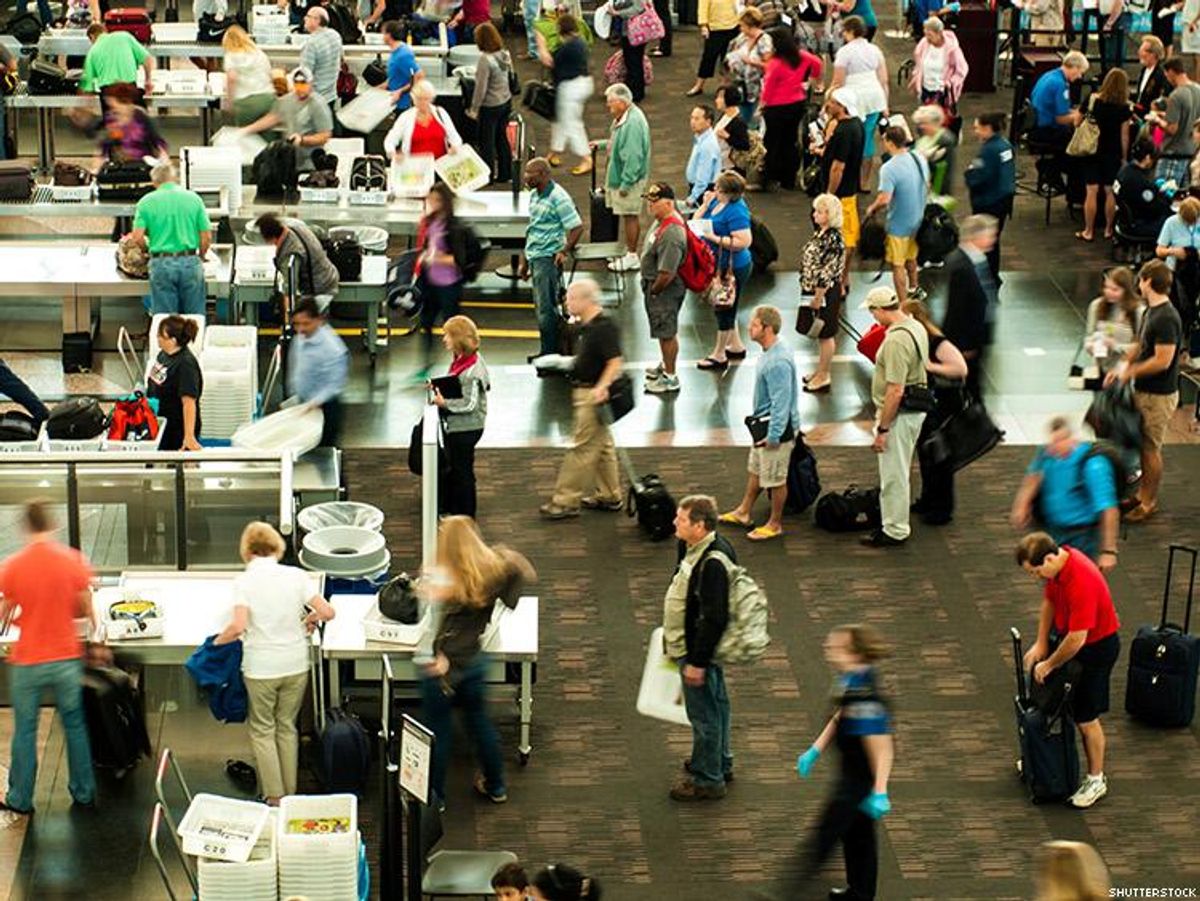"Sir or ma'am or whatever, please step over here," were not the words I wanted to hear from a blue-clad TSA agent twice my size as I was moving through the security line at Denver International Airport.
I was running late for my flight to Washington, D.C., where I was to start my summer legal internship with the National LGBTQ Task Force. My excitement for the trip was promptly squelched as the giant, red-faced man shouted, loudly enough for the whole terminal to hear, "We have anomalies in the chest and groin area. Private screening, female agent requested."
Perfect, I thought. I could feel my neck getting hot, and I looked down and away from the other people in line behind me who had suddenly been alerted to my "otherness."
Despite having changed my name and gender marker on my Colorado driver's license a few months earlier, I still wasn't always read as male at this point in time. My voice had only just deepened, and my facial hair was a far cry from the beard I now regularly wear.
Hustling to grab my carry-on and shoes, two TSA agents escorted me to a private room with fogged glass walls and a small table. Once inside the room, the agents started speaking quietly to themselves. I stood awkwardly, adjusted my shirt, opened and closed my fists.
"Sir, we need to know what's in your pants," said the male agent, not at all hiding his lingering gaze at my crotch.
"I don't think that's any of your business." I said, trying (and failing) to hold back my rage.
"Actually, it is our business, because we know it's not a penis," said the female agent, smugly, like she'd just discovered an important secret.
Before I could think about what to say or how to say it, I reached into my jeans and pulled out my packer (a small prosthesis) and threw it on the table. "There! Is that what you're worried about?"
Both agents turned red and started giggling. I was livid. Frantically, I started unbuttoning my dress shirt and lifted up my white undershirt to show them my chest binder. "And this, this is the other thing you're worried about?" I shouted at them, hoping my newly deepened voice was audible to other travelers beyond the fogged glass walls.
"Now, sir, er, ma'am, uh ... there's no need to get upset," said the female agent. "We are following protocol."
"Protocol my ass." I retorted. "You can't treat me like this just because I'm transgender. And stop calling me ma'am. I'm a dude."
"OK, Mister Charles," the female agent said, mockingly. "No need to get hysterical."
At hearing that word, I felt the blood rush to my face, and I blinked hard to keep from screaming at both of them, who just eyed me, still suspicious. "Are we fucking done here?" I demanded.
"Yes, sir," The male agent replied quietly, vaguely aware of the embarrassment and rage I was feeling. "We'll step out to give you a minute to collect your things." The female agent glared at me as she left.
I buttoned my shirt back up, stuffed the packer into my bag instead of my pants, and stepped quickly out of the room and towards the throng of people heading to their gates, eager to blend in. It wasn't until I had reached the relative safety of a stall in the men's bathroom that I set down my bags and wept into my hands.
I've not told many people about this incident, and perhaps it's clear why: it was demeaning, embarrassing, and most of all, incredibly disrespectful.
Like many trans people who deal with harassment from TSA in the alleged interest of "national security," I felt powerless. I was left feeling like I had done something wrong just by living my life. I didn't want to call more attention to myself by reporting what I presumed was just business as usual. I already felt hyper-visible in a world not meant for people living somewhere between the gender binary of male and female. I worried that reporting what happened would lead to TSA agents further dismissing my dignity and humanity. I couldn't go through that again, and to this day, I avoid air travel whenever possible. But so many trans people can't avoid air travel, and can't avoid situations where they risk being outed and shamed publicly.
As long as TSA continues to assert that treating trans people's bodies as inherently suspicious is "following strict TSA guidelines," as it did in response to Shadi Petosky's awful experience at the Orlando airport late last month, we will continue to be subject to discrimination.
Because let's be real: subjecting me, Petosky, and thousands of trans people around the country to this kind of treatment is not upholding "strict guidelines in the treatment of transgender passengers." Forcing people to be screened according to their assigned sex at birth, calling their bodies "anomalies," and laughing at the things we do to be safe and live with dignity in this transphobic world is not "upholding strict guidelines." It's perpetuating shameful discrimination and we deserve better. Period.

CARL CHARLES is a Skadden Fellow and staff attorney with the American Civil Liberties Union's LGBT and HIV Project. His work at the ACLU focuses on advocating for transgender and gender-nonconforming youth who are homeless, in foster care, or in the juvenile justice system. He is passionate about working for LGBT youth and their families who are impacted by the criminal justice system. Find him on Twitter @rarlrarles.


















































































